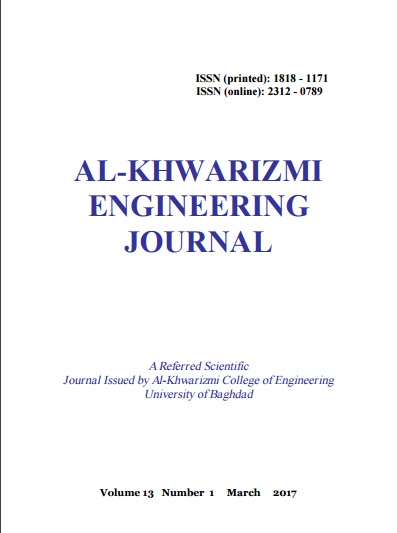Proposed Hybrid Sparse Adaptive Algorithms for System Identification
DOI:
https://doi.org/10.22153/kej.2017.12.003Abstract
Abstract
For sparse system identification,recent suggested algorithms are -norm Least Mean Square ( -LMS), Zero-Attracting LMS (ZA-LMS), Reweighted Zero-Attracting LMS (RZA-LMS), and p-norm LMS (p-LMS) algorithms, that have modified the cost function of the conventional LMS algorithm by adding a constraint of coefficients sparsity. And so, the proposed algorithms are named -ZA-LMS, -RZA-LMS, p-ZA-LMS and p-RZA-LMS that are designed by merging twoconstraints from previous algorithms to improve theconvergence rate and steady state of MSD for sparse system. In this paper, a complete analysis was done for the theoretical operation of proposed algorithms by exited white Gaussian sequence for input signal. The discussion of mean square deviation (MSD) with regard to parameters of algorithms and system sparsity was observed. In addition, in this paper, the correlation between proposed algorithms and the last recent algorithms were presented and the necessary conditions of these proposed algorithms were planned to improve convergence rate. Finally, the results of simulations are compared with theoretical study (?), which is presented to match closely by a wide-range of parameters..
Keywords: Adaptive filter, -LMS, zero-attracting, p-LMS, mean square deviation, Sparse system identification.
Downloads
Downloads
Published
Issue
Section
License
Copyright: Open Access authors retain the copyrights of their papers, and all open access articles are distributed under the terms of the Creative Commons Attribution License, which permits unrestricted use, distribution, and reproduction in any medium, provided that the original work is properly cited. The use of general descriptive names, trade names, trademarks, and so forth in this publication, even if not specifically identified, does not imply that these names are not protected by the relevant laws and regulations. While the advice and information in this journal are believed to be true and accurate on the date of its going to press, neither the authors, the editors, nor the publisher can accept any legal responsibility for any errors or omissions that may be made. The publisher makes no warranty, express or implied, with respect to the material contained herein.
















